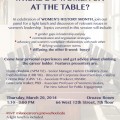 At Milano, the relationships you form as a student, with classmates, faculty, client organizations, and internship sponsors, can be a valuable resource long after you graduate. Aside from the obvious–Milano graduates have married each other and found their life partners–what exactly do we mean?
At Milano, the relationships you form as a student, with classmates, faculty, client organizations, and internship sponsors, can be a valuable resource long after you graduate. Aside from the obvious–Milano graduates have married each other and found their life partners–what exactly do we mean?
We mean that networking is not just a job search skill, but a life skill, just as critical to your long-term career success as it is to finding your first graduate internship or job. The term networking has been so overused, and the activity so abused, that students and alumni often misunderstand or overlook the concept. The experience of networking—reaching out to strangers to ask for advice and increase your contact base in hopes of finding a job—can feel similar to dating, failing to find someone with whom you connect until the right person says “yes.” To change that experience, it’s necessary to change one’s expectations about networking, more accurately and less pejoratively called “relationship building.” Understanding what relationship building can do—open doors, introduce you to people to whom you have no access, build future collaborations and cross-sector endeavors—helps you to have perspective over the long term. Ironically, the better you do this, the better your chances of getting an immediate job, because being introduced to people in a position to hire you is the fastest way to employment. Counter-intuitive, but true.
The consulting firm Challenger, Gray and Christmas claims that relationship building is how 70%-80% of jobs have been found for the past thirty years. If that sounds strange, realize that social media and the internet are tools that connect people, mechanisms for getting to connect to people you don’t already know. What you do with those connections when you find them is what counts. Networking got a bad name during the depths of recessions when desperate jobseekers would demand informational interviews, pump the contacts for information and contacts, fail to thank them for their efforts, yet repeatedly return to the same individuals asking the same questions and begging for more contacts, then slink away ungrateful. No wonder networking came to mean “use me, abuse me, abandon me.”
Effective relationship building, on the other hand, starts on a Policy Lab or Practicum team, or having a conversation long enough at a conference to find a genuine reason to collect a business card you will actually use to follow up, or in a discussion in or after class where you find common ground or an intellectual debate with a classmate, or during an internship project in Hong Kong or Buenos Aires. When you report back to a contact on the outcome of your reaching out to referrals s/he provided, when you figure out how to give back to those who helped you (send an article of interest, pass on a resource, introduce hat person to another), you deepen the relationship. When you establish a connection organically, based on common passions and goals, it may survive graduation, future job changes, geographic moves, and career trajectories that go in divergent directions.
So how do these relationships help you over time? It could be that you need a certain expertise for a future project that no one on your official team has. You could be asked for a reference to support your claim of monitoring and evaluation expertise or SPSS prowess in a future job search. You need a “board of advisors” to bounce your own future career decision alternatives against. You may be researching a prospective client or employer and reach out to someone in your network for intelligence. I have seen a recent alum in a recruiting role ensure that a more experienced Milano alum gets an interview that led to a senior-level job. You could be looking to expand your organization and turn to people you know well to deepen the talent pool. You might find a mentor.
Relationship building also creates an arsenal of good will, and you can “pay it forward,” offering yourself as a coach, reference, resource for those less senior in their careers than you, and for students. The Milano family has deep roots. Some alumni have faithfully kept their alma mater front of mind for decades, and continue to reach out to support the School with their time and attention. You could be called upon to identify talent to refer when a fellow alum or colleague is looking to hire someone. Presidential Management Fellows, Muskie Scholars (returned to former Soviet countries), returned Peace Corps Volunteers, Fulbright Scholars, Chase Community Development Competition teams who attended Milano, all stay connected to these sub-communities of graduates. Alumni provide Milano with client-based team and individual project work, recruit employees and interns here, guest speak in classes, teach or guest speak at career bootcamps, speak to prospective students, give informational interviews to students in job search. Sometimes they teach Milano classes.
Avocational interests also keep alumni connected. Shared interests in social justice causes, advocacy, and politics bond alumni to spend time together years after graduation. Friendships forged this way often last a lifetime. Once at Milano, you are part of the family.




